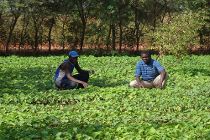Biofuels: Blessing or curse for Africa?
Bio diesel fuelled mini buses were being used at the 16th Conference of the Parties (COP16) to transport attendees to and from talks in Cancun as part of a campaign.

Bio diesel fuelled mini buses were being used at the 16th Conference of the Parties (COP16) to transport attendees to and from talks in Cancun as part of a campaign.
The minibuses were advertising a new initiative, that the Mexican government though of title, 'Chiapas Ecobus 100% Bio diesel' and delegates were promoting – the transference to bio-fuel as a sustainable source instead of fossil fuels. However, Anna Maina and Teresa Anderson of the African Biodiversity Network (ABN) vehemently opposed the campaign.
In an interview with Ghanaian newspaper, Accra Mail they said: "Do COP organisers really not know that the science shows that the production and processing of biofuels produce much more carbon dioxide (CO2) emissions per gallon that fossil fuels like premium petrol or diesel?"
The ABN claimed that biofuels can also be attributed to the global food crisis due to large scale production of bio diesel plantations such as Jathropha.
They added that the campaign for biofuels has resulted in biofuel plantations displacing farmers and indigenous people, as well as the cutting down of rainforests for bio diesel production.
In a report from Ethiopia entitled, "Biofuels – a Failure for Africa", it also agreed with ABN, stating that the COP16 campaign for the use of biofuels is shambolic and counter-productive if we are to make efforts in ensuring a better climate globally. The report reveals that biofuel crops projected to grow well in Africa's drier 'marginal' lands are in fact performing poorly.
The report states: "Much of Africa and international biofuel policy has been based on the assumption that crops such as jathropha curcas would produce significant biodiesel yields when grown on dry lands."
The report discovered that while jathropha is able to survive without water, it needs rain and fertile soils in order to produce oilseeds.
It reveals further that multilateral companies are now focused on enticing local African farmers to grow biofuels on their lands, thereby displacing food crops where there is water and soil fertility, and shifting the burden for crop failure onto indigenous farmers in Africa and their lack of knowledge of modern farming technologies.
Commenting on COP16, the report states: "The UN climate negotiators must recognise that false solution such as biofuels will further Africa's exploitations, not salvation. Instead we need to see real solutions to reduce climate emissions instead of more pressure on Africa."
Biofuels are gaining increased public and scientific attention, driven by factors such as oil price increases, the need for increased energy security, and concern over greenhouse gas emissions from fossil fuels. Due to the oil spill disaster in the Gulf of Mexico earlier this year, the change to biofuel has gained more publicity as people see it as a way out of depending on fossil fuels that are becoming increasingly bad for the environment.
Author: Charity Knight | Climate Action
Image: treesftf | flickr





_400_250_80_s_c1.jpg)
